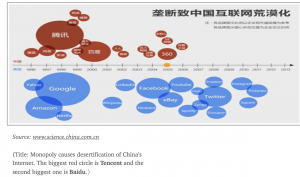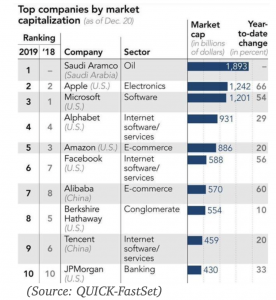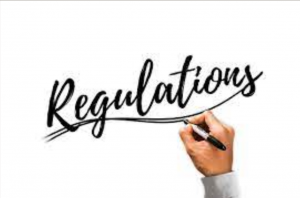
Image by Rudy Herman is licensed under CC BY 2.0
-What is meant by the “techlash”?
The compoundwords appearing in “The Economist” in 2018, referring to the resistance to technology giants (Big tech) such as “Google”, “Facebook”, “Amazon”, “Apple”, “Netflix”,etc from the public, politicians and governments (The Economist, 2018). “Social Media Logos” by BrickinNick is licensed under CC BY-NC 2.0
“Social Media Logos” by BrickinNick is licensed under CC BY-NC 2.0
-What are the public concerns that lie behind the “techlash”?
1. Monopoly

The market structure of natural monopoly appears as the scale of the Internet platform grows, as does the strong increase of users’ interest or the strong network effect, as well as the economies of scale and scope. When the largest corporation works at a lower cost than any real or possible competition, monopoly will always exist (Mansell & Steinmueller, 2020). In terms of social media platforms, Facebook is a natural monopoly because it can offer services to a larger number of users at a cheaper cost.

A research (above) shows that among the top ten companies in the world by market value, seven are technology companies. Among them are Apple, Microsoft, Alphabet, Amazon, Facebook, Alibaba, Tencent and etc., all of which have achieved good results in their respective fields. Technology is the core of social progress, so technology companies also occupy a powerful position in valuation.

“Social Media Mix 3D Icons – Mix #2” by Visual Content is licensed under CC BY 2.0
However, because of the significant position of these companies, problems also come. In Oct.4, Facebook’s server suffered a large-scale failure which lasted for six hours, and its subsidiary products Instagram, WhatsApp and Messenger were affected. Facebook and its platforms have more than 3.5 billion users worldwide (China News, 2021). Users rely on relevant programs to communicate with relatives and friends, while enterprises use programs to contact customers. Numerous people log on to other websites through Facebook accounts as well. This failure has greatly affected users’ lives and business operations.
The National Broadcasting Corporation (NBC) commented that this incident may be an opportunity for the public and governments of various countries to think about how to supervise large-scale scientific enterprises, including strengthening competition in the industry, and preventing a company crash from dragging down the whole world from happening again, “No Internet enterprise should be too big to fail” (NBC, 2021). It can be seen that the accident also highlights the monopoly risk of social platforms. Democratic Progressive Congressman Ocasio Cortes wrote on Twitter that the incident highlighted the serious risks brought by Facebook monopoly. “If the authorities regulate its monopolistic behaviour when Facebook starts to acquire other competitors, people around the world who rely on platforms such as WhatsApp and Instagram for communication and business will not be affected, reflecting that Facebook must be split.” (Cortes, 2021).
2. Privacy

“Internet privacy” by Paul Blackford is licensed under CC BY-NC-SA 2.0
Someone says that “data is the new oil”. The oil is essential for human beings from 18th century, but users’ data seems has become another significant “goods” in the current society.
The Apple has always claimed that it attaches great importance to users’ privacy and promised not to infringe on personal privacy. However, Apple has repeatedly been exposed that it will check users’ personal information, such as collecting users’ voice information by using intelligent voice Siri. According to the latest news, Apple has confirmed that photos and videos uploaded by users to iCloud will also be scanned (Zoysa, 2019). Apple is not the only company that checks users’ private content. Several software giants, such as Facebook, Twitter and Google, have also used a tool called PhotoDNA developed by Microsoft to check pictures by comparing them with the picture database. “Shattered Cinema 4D Effect” by Orange Steeler is licensed under CC BY 2.0
“Shattered Cinema 4D Effect” by Orange Steeler is licensed under CC BY 2.0
-To what extent can these concerns be addressed by governments, by civil society organisations, and by the technology companies themselves?
It is not rare for monopoly to lead to flaws in corporate management and a shift in values, and monopoly’s downsides are widely acknowledged. A number of countries began to legislate to limit monopoly as early as the 19th century, when the world economy established monopoly capitalism. China vigorously accepted anti-monopoly responsibility after joining the WTO, and the Anti-monopoly Law was fully enacted on August 1, 2008 (Xu, 2018). In Australia, there are also organisations such as the Australian Competition and Consumer Commission (ACCC). However, with the rapid growth of the Internet economy in recent years, new types of monopoly have emerged, and monopoly develops more quickly and is more difficult to limit due to the peculiarities of the Internet economy itself.
1. Self regulation
Self-regulation can be more efficient for businesses. It is more rapid than government regulation, allowing consumers to be protected more quickly. However, because platform firms’ primary objective is to make money through enterprise growth and worldwide expansion without regard for public benefit, it is difficult to ensure that they will manage themselves honestly and justly. The execution of platform self-monitoring is weak if there is no incentive mechanism in place. Currently, it is critical to address a number of issues generated by Internet monopolies, which clearly cannot rely exclusively on business self-discipline. To put it another way, in the face of Internet companies’ monopolistic behaviour that consistently harms the public interest, the public should not wait for rectification, but rather constrain them in all directions by cracking down on monopoly and unfair or even vicious competition.

https://pixabay.com/images/id-4249392/
2. Government supervision
Overall, if governments oversee internet corporations, the executive branch will be stronger—with a good external supervision mechanism in place, industry standards may be enforced through law, and oversight will be more effective. However, the process of developing, adopting, as well as monitoring regulations and laws will take a long period, making action too slow to keep up with the rate of scientific and technical innovation and growth. In addition, numerous Internet companies are multinational enterprises, and different nations’ rules and regulations make it difficult to execute them across borders (Dames, 2009). For example, in current modern digital age, the establishment of “General Data Protection Regulations” (GDPR) has made an essential contribution to the protection of individual rights. However, the extent of its enforcement is limited to EU member states, and it does not significantly address global issues.
From the market point of view, breaking monopoly and introducing competition are the fundamental strategies. It is also necessary to take advantage of the coercive restraint mechanism of law to prevent monopoly or raise illegal costs. In addition, a sound supervision system should be built, which requires not only strict implementation of existing norms, but also timely introduction of regulatory norms according to the situation, so as to prevent the occurrence or expansion of behaviours that harm public interests.
3.Public participation

“The Public Participates in the Waste Confidence Meeting in Rockville, Md.” by NRCgov is licensed under CC BY 2.0
Citizens’ involvement in the oversight of technology businesses can raise public’s understanding of the importance of safeguarding their rights and interests. It has the potential to increase public support for supervision and raise awareness of the importance of supervision. Civil society can also bring together a variety of forces to bring individuals from all walks of life together to debate issues. The supervision of civil society organisations, on the other hand, is more of an advocacy endeavour, and its actual implementation necessitates collaboration with the government or technological corporations, finally resorting to the supervision of industry regulations or rules.
To learn more:
Conclusion
Externalities exist in the network—the more users, the higher the network’s value. In contrast to the marginal effect of traditional economies, the zero marginal cost effect of Internet economies means that the expense associated with an increase in network users can be ignored. Therefore, the Internet economy is easy to form a “winner takes all” situation. Once a considerable degree of monopoly is formed, it is difficult for latecomers to compete. Facebook, Google and Baidu are all the same.
Technology companies should completely adhere to the requirements of laws, rules, and regulatory agencies, as well as properly identify and correct problems. The following principles can be used to the government’s relevant work: First, ensure that platform operations are regulated in accordance with the law. Second, follow a fair and strong oversight policy, treating identical enterprises and subjects equally, and enforcing no tolerance for all types of illicit Internet activity. Third, should give development and standards equal weight—not only encourage the companies to innovate and standardise their development under prudent supervision, but we should also resolutely dismantle monopolies and protect the public interest and market order. Laws, rules, and regulatory authorities should be strictly followed by technology companies, and faults should be thoroughly investigated and corrected. The relevant departments, institutions, as well as civil society organisations should continue to press these companies to fulfil its primary responsibilities, implement rectification requirements, strengthen risk management and control, improve social responsibility, and maintain a fair and competitive market environment.
Reference List
1. The Economist. (2018). https://www.economistasia.com/
2. Mansell, R., & Steinmueller, W. E. (2020). Advanced Introduction to Platform Economics. Cheltenham, Edward Elgar, pp. 35-54.
3. China News. (2021). Facebook’s multiple platforms have been down for several hours, highlighting the monopoly risks of social networks? https://author.baidu.com/home?from=bjh_article&app_id=1549761396709004
4. The National Broadcasting Corporation. (2021). http://www.nbc.com/
5. Cortes, O. (2021).
6. Zoysa, S. D. (2019). Sri Lanka Guardian. http://www.srilankaguardian.org/
7. Xu, Y. (2018). Internet monopoly cannot be allowed. https://www.yicai.com/news/
8. Dames, K. M. (2009). Data Is the New Oil. Information Today, 26(8), 14-15. http://ezproxy.library.usyd.edu.au/login?url=https://www.proquest.com/magazines/data-is-new-oil/docview/214797231/se-2?accountid=14757

This work is licensed under a Creative Commons Attribution 4.0 International License.
<a rel=”license” href=”http://creativecommons.org/licenses/by/4.0/”><img alt=”Creative Commons License” style=”border-width:0″ src=”https://i.creativecommons.org/l/by/4.0/88×31.png” /></a><br />This work is licensed under a <a rel=”license” href=”http://creativecommons.org/licenses/by/4.0/”>Creative Commons Attribution 4.0 International License</a>.